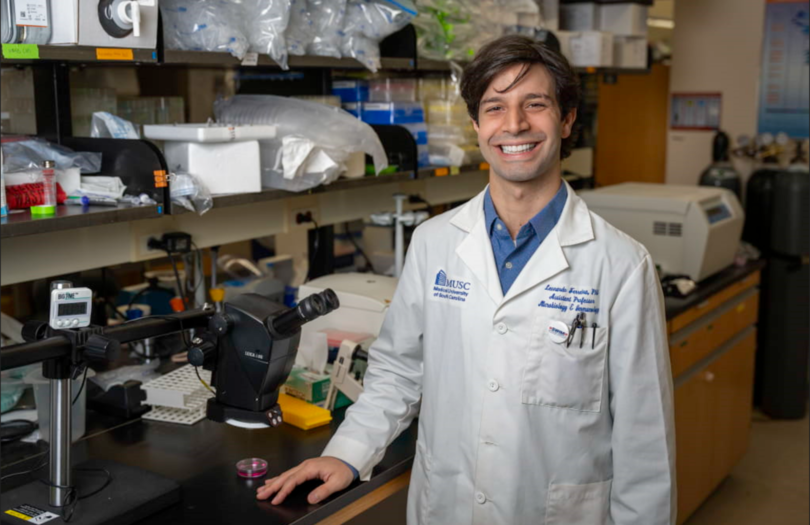Research Interests
The adaptive immune system has evolved to specifically recognize and destroy a virtually infinite variety of pathogens (non-self), while remaining unresponsive towards tissues (self). A subset of helper T lymphocytes dedicated to suppressing immune responses, regulatory T cells (Tregs) are essential to maintain self tolerance and immune homeostasis. Yet, Tregs also constitute a barrier to anticancer immunity by heavily accumulating in tumors, inhibiting their clearance by tumor antigen-specific T cells.
Manipulating human Tregs offers the opportunity to modulate the immune system with antigen specificity in organ transplant rejection, autoimmunity, and cancer. In addition, Tregs have the potential to help correct the defects in tissue repair and curb low-grade chronic inflammation observed in degenerative diseases and aging.
Yet, antigen-specific Tregs are vanishingly rare. Moreover, the best antigen target is often unknown. Synthetic biology can be used to impart a desired specificity to human Tregs, greatly expanding what targets can be pursued using Treg-based therapies. Chimeric antigen receptors (CARs) are synthetic immune receptors comprising an extracellular antibody-based antigen-binding domain and an intracellular signaling domain, allowing for potent T cell activation directly downstream of antigen recognition.
Engineered immune receptors allow one to systematically study how specificity, affinity, and signaling modulate Treg and effector T cell function in physiological and disease contexts. It can also be used to target these cells to specific tissues and disease states and execute desired functions once there.
Recently, in collaboration with the Russ laboratory at the University of Florida, we co-engineered stem cells and Tregs so that the engineered Tregs protect specifially the engineered stem cell-derived tissues. In brief, we genetically modified human pluripotent stem cells to express a unique inert protein ligand on their surface. We then differentiated them into beta cells still expressing that ligand. In parallel, we isolated Tregs from blood and genetically modified them with a CAR such that they now recognize the unique ligand on the engineered beta cells. We demonstrated that this dual engineering allows for localized protection from immune attack of human beta cells by human CAR Tregs in a humanized mouse model of type 1 diabetes.
We are also investigating how CAR signaling impacts human Treg biology and function. We recently discovered that CAR affinity above a threshold imparts pro-inflammatory properties to human Tregs, namely exuberant production of inflammatory cytokines and chemokines and upregulation of effector T cell molecules, with implications to the treatment of both autoimmunity and cancer.
The Ferreira Lab uses CARs and other engineered immune receptors to dissect the biology of T cells subsets in tolerance and immunity, informing the design and development of new engineered immune cell therapies for autoimmune disease, transplant rejection, cancer, and aging.
Leonardo M. R. Ferreira, Ph.D.
Assistant Professor
Department of Pharmacology & Immunology
College of Medicine
Email: ferreirl@musc.edu
Current Lab Members
- Russell Cochrane (PhD Student)
- Avik Chattopadhyay (Postdoctoral Fellow)
- Erin O'Connor (Research Specialist)
- Chayse Nunciato (Undergraduate)
- Francesco Hamilton (High School Student)
Recent Publications
Ghobadinezhad, F., Ebrahimi, N., Mozaffari, F., Moradi, N., Beiranvand, S., Pournazari, M., Rezaei-Tazangi, F., Khorram, R., Afshinpour, M., Robino, R.A., Aref*, A.R., Ferreira*, L.M.R., 2022. The emerging role of regulatory cell-based therapy in autoimmune disease. Front Immunol 13:1075813
Zimmerman, C.M., Robino, R.A., Cochrane R.W., Dominguez, M.D., Ferreira*, L.M.R., 2024. Redirecting human conventional and regulatory T cells using chimeric antigen receptors. Methods Mol Biol 2748:201-241
Cochrane R.W., Fiorentino, A., Allen, E., Robino, R.A., Quiroga, J., Ferreira*, L.M.R., 2024. How to test human CAR T cells in solid tumors, the next frontier of CAR T cell therapy. Methods Mol Biol 2748:243-265
Barra, J.M., Robino, R.A., Castro-Gutierrez, R., Proia, J., Russ*, H.A., Ferreira*, L.M.R., 2024. Combinatorial genetic engineering strategy for immune protection of stem cell-derived beta cells by chimeric antigen receptor regulatory T cells. Cell Rep 43 (11):114994
Cochrane, R.W., Robino, R.A., Granger, B., Allen, E., Vaena, S., Romeo, M.J., de Cubas, A.A., Berto, S., Ferreira*, L.M.R., 2024. High affinity chimeric antigen receptor signaling induces an inflammatory program in human regulatory T cells. Mol Ther Methods Clin Dev 32(4): 101385


